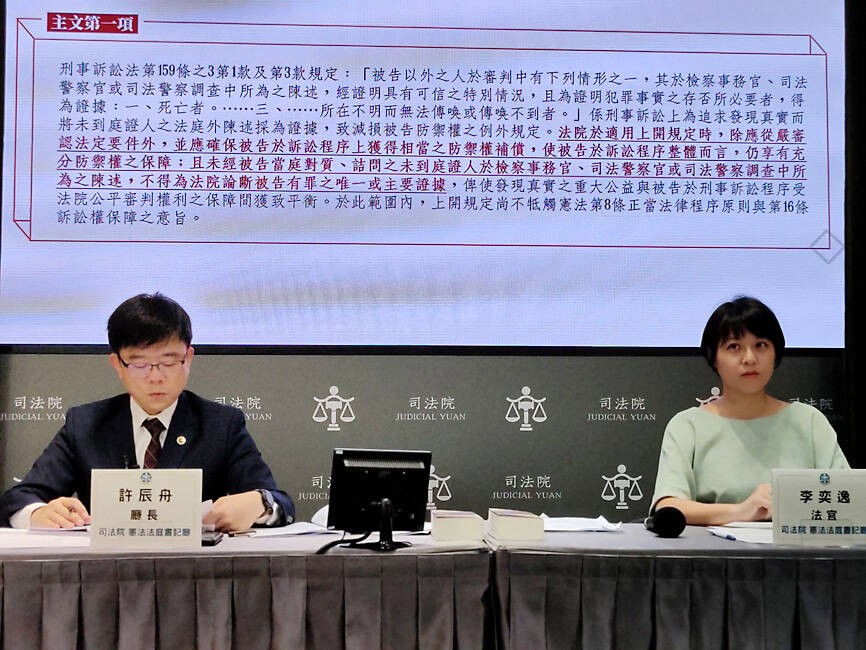The Constitutional Court on Friday ruled that corroborated statements given to prosecutors or judicial police by absent witnesses are admissible as evidence.
The court issued the ruling in response to a request for an interpretation filed by death row inmates Wang Hsin-fu (王信福) and Shen Hung-lin (沈鴻霖), along with three other people in April last year.
That filing said that Article 159-3 of the Code of Criminal Procedure (刑事訴訟法) contradicted Article 8 of the Constitution, which deals with basic rules for arrests, detention and trials, and also contradicts Article 16 of the Constitution, which protects people’s litigation rights, on the grounds that the article deprives defendants of their right of confrontation, and that it allows “uncorroborated” police statements to serve as evidence.

Photo: Wu Cheng-feng, Taipei Times
The petitioners questioned the constitutionality of clauses allowing prosecutors or judicial police officers to use corroborated statements already given by the litigants as evidence, if such statements are necessary for proving guilt or innocence when witnesses cannot attend a trial.
While acknowledging that Article 159-3 of the Code of Criminal Procedure would curtail defendants’ right to cross-examine witnesses, the Constitutional Court in its ruling pointed to the provision that requires a court to scrutinize statements given by absent witnesses in addition to ensuring that the defendant’s right of confrontation is duly compensated for and thus adequately protected.
Additionally, statements provided to prosecutors or judicial police officers by absent witnesses prior to a trial may not serve as the sole piece of evidence based on which a court passes down a guilty verdict, the ruling said.
As such, Article 159-3 of the Code of Criminal Procedure does not contradict articles 8 and 16 of the Constitution, the ruling said.
The Supreme Court in 2011 sentenced Wang to death for ordering Chen Jung-chieh (陳榮傑) to fatally shoot two police officers in 1990. Chen was sentenced to death in 1992 and executed that same year. Wang fled and was not apprehended until 2006.
Shen is on death row for raping and killing two female workers in their dormitory with two other perpetrators, Huang Hsi-jen (黃錫任) and Huang Chi-hsiung (黃啟雄), who were arrested and executed in 1990 and 1991 respectively.
Shen was not captured until 2003. The Supreme Court in 2009 sentenced him to death.

Taiwanese can file complaints with the Tourism Administration to report travel agencies if their activities caused termination of a person’s citizenship, Mainland Affairs Council Minister Chiu Chui-cheng (邱垂正) said yesterday, after a podcaster highlighted a case in which a person’s citizenship was canceled for receiving a single-use Chinese passport to enter Russia. The council is aware of incidents in which people who signed up through Chinese travel agencies for tours of Russia were told they could obtain Russian visas and fast-track border clearance, Chiu told reporters on the sidelines of an event in Taipei. However, the travel agencies actually applied

Japanese footwear brand Onitsuka Tiger today issued a public apology and said it has suspended an employee amid allegations that the staff member discriminated against a Vietnamese customer at its Taipei 101 store. Posting on the social media platform Threads yesterday, a user said that an employee at the store said that “those shoes are very expensive” when her friend, who is a migrant worker from Vietnam, asked for assistance. The employee then ignored her until she asked again, to which she replied: "We don't have a size 37." The post had amassed nearly 26,000 likes and 916 comments as of this

New measures aimed at making Taiwan more attractive to foreign professionals came into effect this month, the National Development Council said yesterday. Among the changes, international students at Taiwanese universities would be able to work in Taiwan without a work permit in the two years after they graduate, explainer materials provided by the council said. In addition, foreign nationals who graduated from one of the world’s top 200 universities within the past five years can also apply for a two-year open work permit. Previously, those graduates would have needed to apply for a work permit using point-based criteria or have a Taiwanese company

The Shilin District Prosecutors’ Office yesterday indicted two Taiwanese and issued a wanted notice for Pete Liu (劉作虎), founder of Shenzhen-based smartphone manufacturer OnePlus Technology Co (萬普拉斯科技), for allegedly contravening the Act Governing Relations Between the People of the Taiwan Area and the Mainland Area (臺灣地區與大陸地區人民關係條例) by poaching 70 engineers in Taiwan. Liu allegedly traveled to Taiwan at the end of 2014 and met with a Taiwanese man surnamed Lin (林) to discuss establishing a mobile software research and development (R&D) team in Taiwan, prosecutors said. Without approval from the government, Lin, following Liu’s instructions, recruited more than 70 software